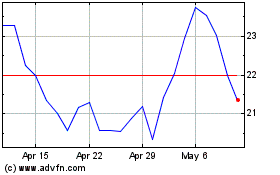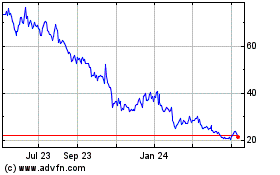Prothena Corporation plc (Nasdaq:PRTA), a late-stage clinical
biotechnology company focused on the discovery, development and
commercialization of novel protein immunotherapies, today announced
that clinical data from the Phase 1b multiple ascending dose study
of PRX002 in patients with Parkinson’s disease will be highlighted
in an oral presentation in the late-breaking therapeutic strategies
session at the 13th International Conference on Alzheimer's and
Parkinson's Diseases (AD/PD), to be held March 29 – April 2, in
Vienna, Austria. PRX002, also known as RG7935, is a monoclonal
antibody for the potential treatment of Parkinson's disease and
other related synucleinopathies, and is the focus of a worldwide
collaboration between Prothena and Roche. A Phase 2 clinical study
of PRX002/RG7935 in patients with Parkinson's disease is expected
to begin in 2017.
Clinical data from the Phase 1b multiple
ascending dose study of PRX002/RG7935 in patients with Parkinson’s
disease, will be presented in the following oral session:
Results from a Phase 1b Multiple Ascending-dose Study of
PRX002/RG7925, An Anti-alpha-synuclein Monoclonal Antibody, in
Patients with Parkinson’s Disease
- Presenter: Joseph Jankovic, MD, Distinguished Chair in Movement
Disorders, Baylor College of Medicine
- Session: Symposium 58 – Late Breaking Therapeutic Strategies in
AD and PD
- Date and Time: Oral presentation – Sunday, April, 2, 12:00 –
12:15 PM CET (6:00 – 6:15 AM EDT)
- Location: Hall C, Austria Center, Vienna, Austria
An investor conference call and webcast to
discuss the results is planned for Sunday, April 2, 2017 at 9:00 AM
EDT, and dial-in details will be made available in advance of
the call.
In addition, an abstract on the feasibility of
using smartphone-based assessments and sensors to monitor symptoms
and mobility in patients with early-stage Parkinson’s disease will
be presented in the following oral presentation:
Remote, High-frequency Monitoring of Motor Symptoms in
Early-stage Parkinson’s Disease Patients in the Phase 1b
RG7935/PRX002 Clinical Trial
- Presenter: Michael Lindemann, Professor, Baden-Württemberg
Cooperative State University
- Session: Symposium 58 – Late Breaking Therapeutic Strategies in
AD and PD
- Date and Time: Oral presentation – Sunday, April, 2, 12:15 –
12:30 PM CET (6:15 – 6:30 AM EDT)
- Location: Hall C, Austria Center, Vienna, Austria
Prothena and Roche to Co-Host
Symposium
In addition to the scientific presentation,
leading researchers in the field of Parkinson's disease will
present at a symposium entitled “Beyond the Basal Ganglia:
Alpha-synuclein Pathology and Non-motor Manifestations in
Parkinson’s Disease” during the conference. The symposium will be
held on March 31, 2017 at 5:15 PM local time, and will feature
experts from around the world, including: Thomas Beach, MD, PhD,
Sun Health Research Institute, Sun City; Patrik Brundin, MD, PhD,
Van Andel Research Institute, Grand Rapids; Jamie L Eberling, PhD,
The Michael J. Fox Foundation for Parkinson’s Research, New York;
Tom Isaacs, The Cure Parkinson’s Trust, Rickmansworth, Herts; Brit
Mollenhauer, MD, Georg-August University Göttingen, Göttingen;
Wolfgang Oertel, MD, PhD, of University of Marburg, Marburg; Ronald
Postuma, MD, MSc, McGill University, Montreal.
About Alpha-synuclein
Alpha-synuclein, a protein found in neurons and
other cells, is a major component of pathology that characterizes
several neurodegenerative disorders including Parkinson's disease,
dementia with Lewy bodies, and multiple system atrophy, which
collectively are termed synucleinopathies. While the normal
function of alpha-synuclein is not well understood, the protein
generally occurs in a soluble form. In synucleinopathies, the
alpha-synuclein protein can misfold and aggregate to form soluble
aggregates and insoluble fibrils that contribute to disease
pathology. There is increasing evidence that this disease-causing
alpha-synuclein can be propagated and transmitted from neuron to
neuron, resulting in an infection-like spread of neuronal death.
Recent studies in cellular and animal models suggest that the
spread of alpha-synuclein-associated neurodegeneration can be
disrupted by targeting aberrant forms of alpha-synuclein.
About PRX002/RG7935
PRX002/RG7935 is a monoclonal
antibody under development for the potential treatment of
Parkinson's disease. PRX002/RG7935 targets
alpha-synuclein and is designed to slow the progressive
neurodegeneration associated with alpha-synuclein misfolding and/or
the cell-to-cell transmission of the aggregated pathogenic forms of
alpha-synuclein found in Parkinson's disease and other
synucleinopathies. Prior to initiating clinical trials, Prothena
demonstrated the efficacy of PRX002/RG7935 in
various cellular and animal models of alpha-synuclein-related
disease. In multiple transgenic mouse models of Parkinson's
disease, the murine version of PRX002/RG7935,
reduced the appearance of alpha-synuclein pathology, protected
synapses and improved performance in behavioral testing. In
December 2013 Prothena and Roche entered into a worldwide
collaboration to develop and commercialize antibodies that target
alpha-synuclein, including PRX002/RG7935. Prothena
has an option to co-promote PRX002/RG7935 in the
U.S., where the companies share all development and
commercialization costs, as well as profits, on a 30/70 basis (30
percent Prothena, 70 percent Roche). Outside the U.S., Roche will
have sole responsibility for developing and commercializing
PRX002/RG7935 and will pay Prothena up to
double-digit royalties on net sales. A Phase 2 clinical study of
PRX002/RG7935 in patients with Parkinson's disease
is expected to begin in 2017.
About Parkinson's Disease
Parkinson's disease is a progressive
degenerative disorder of the central nervous system (CNS) that
affects one in 100 people over age 60. With an estimated seven to
10 million patients living with Parkinson's disease worldwide, it
is the second most common neurodegenerative disorder after
Alzheimer's disease. The disease is characterized by the neuronal
accumulation of aggregated alpha-synuclein in the CNS and
peripheral nervous system that results in a wide spectrum of
worsening progressive motor and non-motor symptoms. While diagnosis
relies on motor symptoms classically associated with Parkinson's
disease, non-motor symptoms may present many years earlier. Current
treatments for Parkinson's disease are symptomatic and only address
a subset of symptoms such as motor impairment, dementia, or
psychosis. Symptomatic therapies do not target the underlying cause
of the disease and lose effectiveness, often leading to
debilitating side effects as the disease progresses.
About Prothena
Prothena Corporation plc is a global, late-stage
clinical biotechnology company establishing fully-integrated
research, development and commercial capabilities. Fueled by its
deep scientific understanding built over decades of research in
protein misfolding and cell adhesion — the root causes of many
serious or currently untreatable amyloid and inflammatory diseases
— Prothena seeks to fundamentally change the course of progressive
diseases associated with this biology. The Company’s pipeline of
antibody therapeutic candidates targets a number of indications
including AL amyloidosis (NEOD001), Parkinson's disease and other
related synucleinopathies (PRX002/RG7935),
inflammatory diseases, including psoriasis and psoriatic arthritis
(PRX003), and ATTR amyloidosis (PRX004). The company continues
discovery of additional novel therapeutic candidates where its deep
scientific understanding of disease pathology can be leveraged. For
more information, please visit the company's website
at www.prothena.com.
Forward-looking Statements
This press release contains forward-looking statements. These
statements relate to, among other things, plans for and the timing
of initiating a Phase 2 clinical study of
PRX002/RG7935; and the design of
PRX002/RG7935 and its potential as a disease
modifying treatment for Parkinson's disease. These statements are
based on estimates, projections and assumptions that may prove not
to be accurate, and actual results could differ materially from
those anticipated due to known and unknown risks, uncertainties and
other factors, including but not limited to the risks,
uncertainties and other factors described in the "Risk Factors"
sections of our Annual Report on Form 10-K filed with the
Securities and Exchange Commission (SEC) on February 27, 2017 filed
with the SEC. Prothena undertakes no obligation to update publicly
any forward-looking statements contained in this press release as a
result of new information, future events or changes in Prothena's
expectations.
Contacts:
Investors: Tran Nguyen, CFO
650-837-8535, IR@prothena.com
Media: Ellen Rose, Head of Communications
650-922-2405, ellen.rose@prothena.com
Prothena (NASDAQ:PRTA)
Historical Stock Chart
From Mar 2024 to Apr 2024

Prothena (NASDAQ:PRTA)
Historical Stock Chart
From Apr 2023 to Apr 2024
